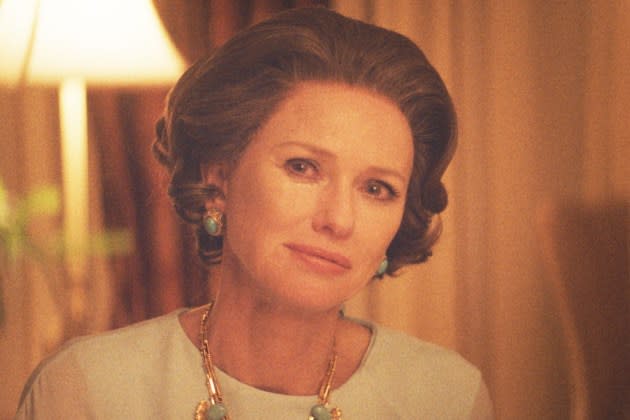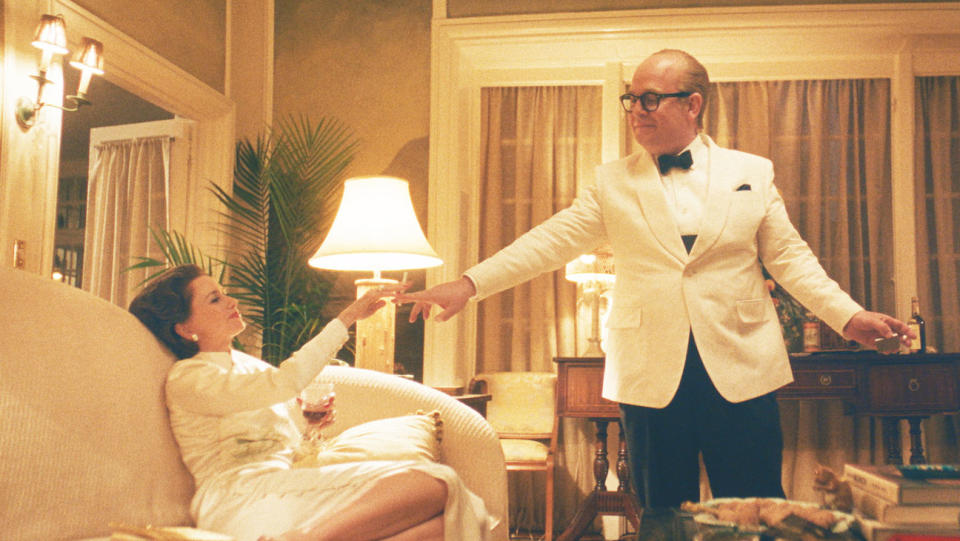Naomi Watts on Babe Paley’s ‘Feud’ Story Arc and if She and Capote Ever Rekindled

[This story contains spoilers from episode seven of Feud: Capote vs. The Swans.]
American socialite and former magazine editor Babe Paley was married to CBS founder William S. Paley for 31 years. But according to Naomi Watts, who portrays her in Ryan Murphy’s Feud: Capote vs. The Swans, her relationship with Truman Capote was the deepest romance she’d ever had — minus the sex.
More from The Hollywood Reporter
Calista Flockhart on High Stakes of Playing Lee Radziwill in 'Feud' and Sad End of Old New York
'Feud' Bosses Explain Mid-Season Bottle Episode With James Baldwin and Truman Capote
“Babe gave herself to this man and all of her secrets,” Watts tells The Hollywood Reporter in the conversation below. “She really trusted him, thinking they were such close friends that he would never dare to expose them.”
It’s for that reason Capote’s actions led to Paley “just [coming] undone,” the star and executive producer had explained earlier in the season to reporters, including THR. As shown in the second season of the FX anthology series, Capote (played by Tom Hollander) reveals the most intimate details of the lives of Paley and the women in her social circle — i.e. “the swans,” Slim Keith (Diane Lane), Ann Woodward (Demi Moore), Lee Radziwill (Calista Flockhart) and C.Z. Guest (Chloë Sevigny) — in a series of essays published in Esquire magazine.
“I think all of the wounds start coming to surface, not just the wound that he has created, but the wounds of her life,” she had added at the time. “She’s also facing her death through her sickness, so a lot of big questions are coming up about regrets. ‘What has my life amounted to? What could I have done? What should I have done?’”
Those questions came to a head in the penultimate episode of Feud, “Beautiful Babe,” which finds the wife and mother succumbing to lung cancer after a four-year battle. It’s during the last days of her life that Babe finds the voice to tell her husband, Bill (the late Treat Williams), about the toll his decades of philandering have taken on her and their family. Yet it’s only in a death dream sequence that she reunites with Capote, her true love.
“It’s personally sad for me to think a grudge would consume you and that forgiveness was an impossible thing, given how much they loved each other,” says Watts in a follow-up conversation with THR, noting that there are conflicting stories about whether Paley and Capote ever rekindled their friendship in real life following his betrayal.
Below, Watts talks about her physical and emotional transformation to become Babe Paley and why it’s a role she’ll never forget.
***
What materials outside of the script did you use to inform your portrayal of Babe Paley?
You collect all these wonderful pictures where a lot of the story would be told, not just in the clothing and the outfits, but how she held her hands, where her eyes were looking. You kind of just had to piecemeal as much information as you could out of a bunch of pictures. There’s plenty to read up on her, and I did do a deep search for anything audio or visual in terms of recordings because creating the physicality and her vocal tone was going to be interesting. There were lots of things available of the other women around her, the other swans.
Tom Hollander said you both were “as nervous as 6-year-old children doing a school play” during your first rehearsal, because he was revealing his Capote voice and you were unveiling your set of fake teeth. Why was that an important feature to embody Babe?
She had a car accident, we knew that much, when she was very young, and she had false teeth. And of course when she had the new teeth done, they were really quite perfect teeth. And I certainly don’t have perfect teeth, and though my teeth are not terrible, we wanted to really try and make them as close to her as possible. But you don’t want to look goofy, you don’t want to sound strange, and, whenever working with any kind of prosthetic, you don’t want to be drawn to that kind of detail. You want to still be able to tell the story as truthfully as possible. So we did it once with an upper and lower set, and people that saw the pictures or heard me doing videotapes of them in the rehearsal period were, like, “Oh no, I don’t think that’s a good idea. That’s risky.” And I said, “Look, before we throw this idea out, let’s see if we can tone them down a bit, make them a little smaller,” and we did.
I really had to work very hard to get rid of any lisp sounds because you have to learn how to speak with them in your mouth. It’s a whole new feeling and your tongue is placed differently because of them. My dialect coach who helped me get the accent right, Liz Himelstein — whom I’ve worked with for more than two decades — was nervous. But I just kept really wanting to make sure we try and see if I could get it to a place where it was believable and what we decided in the end was to just use the upper set until the “Beautiful Babe” episode where she passes, because it created a more kind of drawn look to the face and something slightly harder looking about her at the end of her life. And I’m actually really glad that I fought for it because there were a lot of nerves, including my own, that I had to work against. But I think it really does elevate her. It gives her that feeling of a sophisticated woman. And whenever I see them in certain pictures, it does feel closer to her.

In the “Beautiful Babe” episode, Babe expresses a desire to see her daughter before she dies and her husband, Bill Paley, tells her she doesn’t want to see her because she’s “cold.” Is that how you would characterize her?
Well, she had moments where she was removed and had to disassociate, certainly when it was concerning that relationship, because Lord knows she had to endure a lot of pain with all his philandering. So she had to steel over and keep her presentation together, keep moving through life, despite all the humiliations that were right there under her nose. And there was a certain strength, I suppose, that built up, the skin that just kept thickening. But underneath, I think as she got closer to the end of her life, she was kind of mad about having endured it in that way and had certain regrets and questions of, “What has my life amounted to?” and “Should I have left him long ago?” I think she wanted to bond with him. There was true love, it seemed, at the beginning, and she certainly tried to make it work. But the what-ifs came to her as she got closer to the end. What would her life have looked like had she let go?
We see Babe finally get to say what she’s wanted to say to these two men who hurt her, Bill and Truman, in that episode. How satisfying was it for you as an actress to get to express what Babe had been holding in for so long in the series?
The arc of Babe was truly one for the books and for me. I honestly will never forget that experience, not just the reading of the material and the playing of the character, but sharing the creative space with all of these real heavyweight, talented people across the board. Not just the actors, but all the people behind the scenes, Gus [Van Sant] and Robbie [Jon Robin Baitz], and obviously Ryan for putting us all together and his delicious writing. I feel immense gratitude to be able to play that arc with all of those emotions. Yes, she had moments of bristling and being cold and prickly, but there’s true fragility underneath those veneers, as well. She was a very elegant but pained woman. It’s unbelievably satisfying as an actress to be able to put forth that kind of humanity.
There’s a scene where C.Z. Guest tells Capote that his essays “cheapened the nuance of our lives.” How does this series attempt to undo what he did?
Babe gave herself to this man and all of her secrets. She really trusted him, thinking that they were such close friends that he would never dare to expose them. It’s easy for me to sit here with all the distance and time from this story and, perhaps say, “Oh, isn’t there some naivete there?” But at the same time, if I’m really in her skin, I’m able to understand her need for that relationship, this hole in her life of not having that real closeness with anyone, not even her friends, to an extent. There was something very unthreatening, ironically, about this man. There was no sexual tension, just pure friendship and interest and fascination with each other. Both had come from certain tragedies in their backgrounds, and both had a need for each other and there was something sort of weirdly transactional about it as well, but I believe that Babe and Truman had something really special. That they were like peas in a pod, like brother and sister and they needed each other, but the further into their friendship, which was successful for a couple of decades, as he got more addled with alcohol and drug abuse, that’s when I think wrong moves and liberties were taken that were, in Babe’s mind, unforgivable.
Speaking of Babe’s friendships, do we know if Slim Keith actually had an affair with Bill Paley as it’s shown in the series?
We don’t. That’s an interpretation that we stuck with. There have certainly been things that have led us to believe that, but I don’t want to be beholden to saying this was the case. This is storytelling.
Throughout the series, Babe appears to want to forgive Capote and reunite with him, though she never does. Why do you think that is?
I think she wanted to, but as she got closer to the end and sicker and sicker, she got more fragile, and she was sort of held up by Slim and didn’t want to veer too far from the group. I think she was definitely conflicted about whether she should or shouldn’t. She certainly softened and she certainly missed him deeply, but it was a really hard decision for her to not forgive and not go back.
Feud: Capote vs. The Swans releases its finale episode on FX next Wednesday at 10 p.m., streaming the following day on Hulu.
Best of The Hollywood Reporter

 Yahoo News
Yahoo News 
